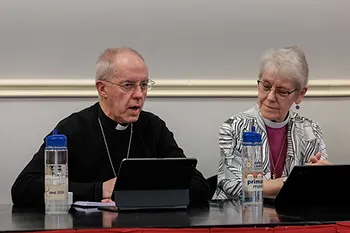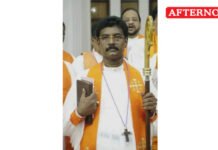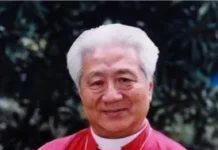“The Primates Meeting has been wonderful,” declared the Archbishop of Canterbury in the official Press Release.
But his face at the Press Conference suggested that it had also been exhausting, which might explain why he appeared to struggle to give coherent answers when it came to some pretty simple questions.
Question 1: Who had come to the Primates Meeting and who had stayed away?
Initially, the Archbishop was assisted by the ACO Communications Director, who told the group, “There are 32 Primates that are present at this meeting, and of those that aren’t here two have sent letters of support, others are not here for personal reasons and not all haven’t attended due to disagreement.”
That did not satisfy, and the same question was asked again. This time Justin Welby tried to answer, admitting, “I haven’t got in my head the exact number. I know that certain primates haven’t attended either because, in one case family illness in one case of pressure in their own province and in a number of cases because of conscience reasons.”
When the question was asked a third time, Justin Welby had had more time to prepare, and his answer was as little more detailed.
“I’ve been doing some sums. What I’ve forgotten is, what I’m aware of is, I can count in front of me nine primates, nine provinces absent by choice, of whom two wrote supportive letters and two were also, the same two I think, were also fully participating in IASCUFO [Inter-Anglican Standing Committee on Unity Faith and Order].
Secondly, I know of two provinces that were absent against their choice and possibly a third from among the nine, that because of situations in their province, travel is extremely difficult or impossible and, er, um, and so you could say nine – seven of whom wrote, er two of whom wrote supportive letters and two of whom had no choice about being absent, er two to three of whom had no choice about being out of the provinces, had no choice about being absent because of their own difficulties.”
So, putting aside all the distractions about who wrote letters of support, or why individuals couldn’t be there, having done his sums the Archbishop of Canterbury was sure that there were eleven primates missing.
But then, in an unusual move, the list of those who attended was published.
And the numbers really didn’t add up.
Time for some sums:
There are 42 provinces in the Anglican Communion and 42 corresponding Primates – however, at recent meetings the Church of England and the Church of Aotearoa, New Zealand and Polynesia have been represented by two Primates each – making an expected total of 44.
There were 32 names on the official list, 30 of whom could be described as Primates, two of whom could be considered as ‘extras’. The final two bishops on the list were representatives of Primates who were unable to attend.
So, just 30 of the 42 Provinces were represented at the Primates Meeting so twelve of them were missing.
We are told, two had personal reasons – and presuming this does not include the Primates of TEC and North India, who sent representatives – this suggests that ten must have stayed away for reasons of conscience.
Twelve, rather than eleven, missing. Ten, rather than nine, missing for reasons of conscience. Which means someone has been forgotton – and that rather undermines the sentiment expressed by the Archbishop of Canterbury earlier in the Press Conference:
“It has been a week of family. Some members of family absent, which has been very, very grievous to us. But they are no less loved for their absence and no less do we long to see them present and to hear their voices and their words and their thoughts.”
No less loved, no less wanted – but one just slipped the mind.
It is, perhaps, an easy mistake – but one which could easily have been avoided all together if the Anglican Communion Office had been honest from the start and published the attendance list along with their publicity photo rather than being forced to do so after they had all gone home.
Question 2 – Why have some stayed away deliberately – what is the crux of the issue?
Again the Archbishop of Canterbury did his best to answer the question, however awkward, he felt:
“In a number of cases, because of conscience reasons, the presenting issue on that remains the decision of the Church of England to explore further the degree to which it will support the blessings of couples in same-sex relationships, where those relationships have already been formally established through a civil registration ceremony, in other words, where they already legally in a marriage under English law.
That, as yet, the church has not changed its rules on that, it has clarified them and provided some resources for what was going on before, that may or may not be used, and nobody is compelled to use them.
And, and, the discussions as to where we go further are still continuing and no final decision has yet been taken. We all have different views on that, but it would be it would be very presumptuous of me to try and predict how that will end.
And so that’s why some people have stayed away.”
No mention of the “joy and celebration,” he felt when he spoke to the English media when the Prayers of Love and Faith were unveiled in February 2023. No mention of his “self-denying ordinance,” which would see him not use the prayers himself. Instead, it is hard to imagine a more downbeat description of the much vaunted ‘Prayers of Love and Faith’.
But more than that – there is no mention of the decades of disagreement which have plagued the Anglican Communion before any decision of the Church of England, nor any hint at why such decisions cause grievous division.
Perhaps Justin Welby would have been helped by re-reading Gafcon’s Kigali Commitment:
“Despite 25 years of persistent warnings by most Anglican Primates, repeated departures from the authority of God’s Word have torn the fabric of the Communion. These warnings were blatantly and deliberately disregarded and now without repentance this tear cannot be mended.
The latest of these departures is the majority vote by the General Synod of the Church of England in February 2023 to welcome proposals by the bishops to enable same-sex couples to receive God’s blessing. It grieves the Holy Spirit and us that the leadership of the Church of England is determined to bless sin.”
It’s the problem with spin
Two simple questions – which both the ACO and the Archbishop of Canterbury knew would be asked. Two simple questions with very simple answers.
In fact, it would have been easy enough just to celebrate the number of Primates who did attend the meeting – the leadership of Gafcon and GSFA may have been disappointed to see the names and faces of some of their number in Rome. But the decision was taken to try and avoid the issue – to pretend all was well.
And in the end the spin required to cover-up the absences and minimise the extent of the division in the Anglican Communion led to mistakes and has revealed just how tenuous all the claims of being a ‘family’ really are.



